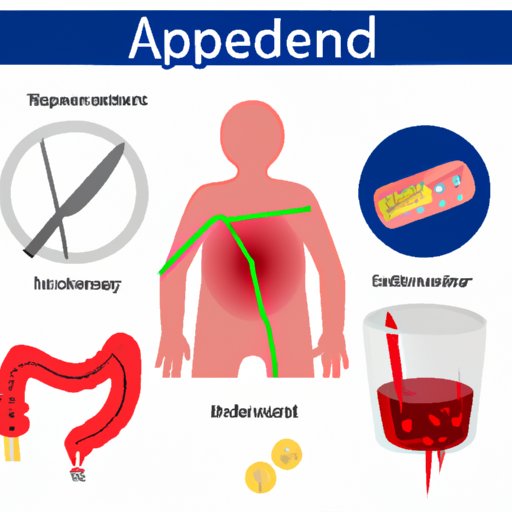
Introduction
Appendicitis is a common medical condition that affects millions of people worldwide. It is an inflammation of the appendix, a small tubular organ attached to the large intestine. It is estimated that about 1 in every 20 people will experience appendicitis at some point in their life. This article focuses on shedding light on the dangers of Appendicitis, its symptoms, and treatment options.
Appendicitis: A Deadly Condition You Need to Know About
Appendicitis is the result of an obstruction of the appendix lumen, which can lead to inflammation, infection, and in severe cases, death. Some common causes of appendicitis include blockages caused by fecal matter, foreign objects, or tumors. The early signs and symptoms of the condition include abdominal pain, nausea, vomiting, and low-grade fever.
While early diagnosis and prompt treatment can prevent severe complications, appendicitis is still considered a deadly condition if left untreated. The condition can quickly progress to a life-threatening situation, leading to the spread of infection throughout the body or even organ failure. Many individuals often disregard their symptoms or attribute them to something less severe, leading to delayed and inadequate medical care.
Symptoms and Treatments for Appendicitis: Can It Really Be Fatal?
It is vital to recognize the early signs of appendicitis to ensure timely diagnosis and treatment. Some common symptoms include pain in the lower right side of the abdomen, fever, chills, vomiting, and nausea. Pain may start off as vague and mild but may become severe within hours and can be particularly painful when walking or coughing.
Our medical experts say that diagnosis is typically made by thorough evaluation of the person’s symptoms, physical examination, and laboratory tests. Imaging tests such as ultrasound and CT scans are often used to confirm diagnosis and help guide treatment accordingly.
The treatment for appendicitis usually involves surgery to remove the inflamed appendix, known as an appendectomy. If left untreated, the appendix may burst, leading to further infection and medical complications. Sometimes alternative treatments such as antibiotics or drainage are used to manage the condition if surgery is not an option.
As per recent studies, the survival rate for appendicitis is typically high, with most people experiencing a quick and uneventful recovery.
What Happens When Your Appendix Bursts: Exploring the Consequences of Untreated Appendicitis
Delaying treatment for appendicitis increases the risk of the appendix bursting, which can be life-threatening and lead to severe medical complications. A ruptured appendix can cause infection in the abdomen, peritonitis, and sepsis. These complications can be fatal if not treated immediately.
Once the appendix ruptures, bacteria from the organ can spill into the abdomen. This raises the risk of peritonitis, a severe infection of the lining of the abdominal cavity. Symptoms of peritonitis are a sudden onset of intense abdominal pain accompanied by chills, high fever, and fatigue.
Immediate medical attention is essential if a ruptured appendix is suspected. Treatment typically involves powerful antibiotics, surgery to clean the affected area or to drain an abscess, and other supportive measures. Recovery time may depend on the severity of the infection and the underlying medical condition. In severe cases, hospitalization may be required for an extended period, and intensive care may be necessary.
Surviving Appendicitis: A Personal Story of a Near-Death Experience and the Importance of Early Detection
One patient narrates their near-death experience after ignoring the early symptoms of appendicitis. The patient was finally diagnosed with perforated appendicitis and required an emergency operation. The recovery period was long, with multiple procedures to help repair the damage caused by the condition.
The patient urges readers to recognize the early warning signs of the condition and seek prompt medical attention. Early detection and treatment can significantly increase the chances of survival, prevent severe complications, and reduce recovery time.
Preventing Appendicitis from Becoming a Life-Threatening Emergency
While appendicitis may not always be preventable, certain lifestyle changes and pre-emptive measures can help reduce the risk of developing this condition. Maintaining a healthy diet and regular exercise can promote intestinal health and reduce the risk of blockages that can cause appendicitis. Some over-the-counter medication, like nonsteroidal anti-inflammatory drugs (NSAIDs), can also help manage the early symptoms of appendicitis.
If symptoms persist, seek medical help immediately. Early detection, diagnosis, and treatment are crucial in preventing this life-threatening medical emergency.
The Risks of Ignoring Abdominal Pain: How Appendicitis Can Quickly Turn Fatal
Ignoring abdominal pain can turn a manageable condition into a life-threatening emergency. Appendicitis is a classic example of how ignoring the early symptoms of an illness can lead to severe medical risks.
While not every case of abdominal pain is serious, it is essential to pay attention to the pattern and manifestation of symptoms. In addition to knowing the warning signs of appendicitis, pay attention to any pain or discomfort in the abdominal region that lasts more than a day or two.
If you suspect that something may be going on with your health, regardless of the severity, it is always better to seek professional medical help right away.
Conclusion
Appendicitis is a life-threatening medical emergency that requires prompt medical attention. The early warning signs include abdominal pain, nausea, vomiting, and fever. Delaying treatment can lead to ruptured appendix, organ failure, and, in severe cases, even death. Untreated appendicitis may lead to peritonitis, a severe infection of the lining of the abdominal cavity. Early detection, diagnosis, and prompt treatment can significantly increase the patient’s chances of survival. Lifestyle changes, such as maintaining a healthy diet and regular exercise, can also help reduce the risk of developing appendicitis.
Remember to seek medical help immediately if you suspect that something is wrong. The consequences of ignoring abdominal discomfort can be life-threatening.





